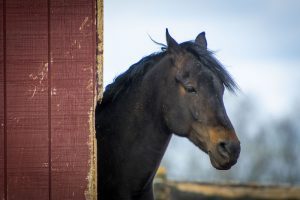Eastern Equine Encephalitis (EEE) has been detected in Connecticut again this year and a horse has been infected. The Connecticut Veterinary Medical Diagnostic Laboratory (CVMDL) at UConn and the Connecticut Agricultural Experiment Station are both monitoring the disease through mosquito testing.
Clinical signs in horses include continuous walking, depression, and somnolence, to aggression and excitability. Some horses may become frenzied after any stimulation. Horses do not develop high enough levels of the EEE or WEE virus in their blood to be contagious to other animals or humans.
The prognosis for horses with EEE is generally poor, with a mortality rate of 70-90%. Those that survive may have permanent neurological damage. Prevention through vaccination is crucial, as it provides the best protection against EEE in horses. Learn more in this UConn Extension Fact Sheet on equine vaccines for mosquito-borne illnesses and prevention steps.
More information on protecting humans and animals is also available from UConn’s Department of Pathobiology and Veterinary Science.
You can also watch this YouTube video with advice on protecting your horse.
